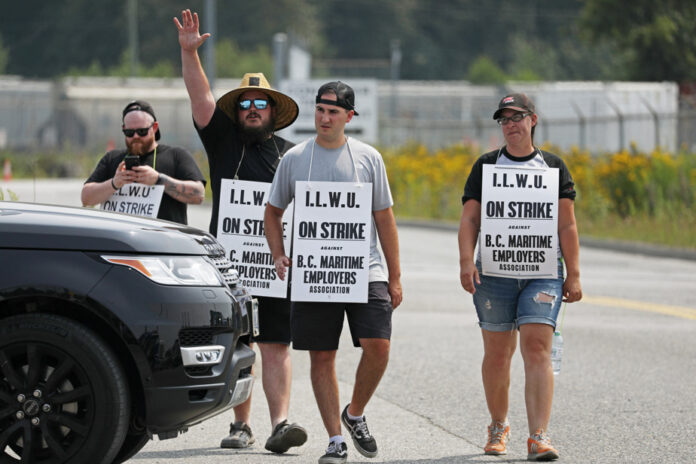(Vancouver) The president of the union representing striking British Columbia longshoremen says employers are waiting for Ottawa to do the “dirty work” instead of negotiating and ending a strike that began six days ago.
Leaders of Canada’s International Longshore and Warehouse union also say the employers’ association is more interested in a ‘campaign of dirty tricks’ than resuming talks, which reached an impasse last Monday. .
The British Columbia Maritime Employers Association has sought binding arbitration to end a strike involving approximately 7,400 stevedores at more than 30 ports.
Longshoremen who are members of this union went on strike on Canada Day after voting overwhelmingly in favor of the strike. In addition to wage increases, they are calling for provisions against outsourcing and automation.
Union president Rob Ashton told hundreds of workers at a solidarity rally in Vancouver on Thursday that “the employer has walked away from the table three times.”
The union leader said in a statement on Thursday that the employers’ association had published incorrect information on the earnings of longshoremen.
“They don’t want to negotiate with us. They don’t want to do the right thing for the stevedoring division workers, who have put their lives at risk during the COVID pandemic, he said. They try to wait for the (federal) government to do their dirty work because they don’t want to treat us with respect. »
The association said Wednesday that binding arbitration could quickly resolve the conflict. But Federal Labor Minister Seamus O’Regan is instead urging the parties to seek non-binding mediation and resume negotiations.
O’Regan met with his provincial counterpart, Harry Bains, on Wednesday to discuss the strike, which has slowed operations at Canada’s busiest port, Vancouver, as well as the third busiest, Prince Rupert.
Canadian Pacific, now called “Canadian Pacific Kansas City”, announces that it has imposed temporary embargoes on rail traffic to the Port of Vancouver this week.
Officials in Alberta and Saskatchewan have joined trade associations in British Columbia and across Canada in calling on the federal government for special legislation to force striking workers back to work.
“Negotiations are still at a standstill, but the (management side) remains ready to come back to the table at any time, as long as (the union) is prepared to present a reasonable proposal,” the employers’ association wrote in a statement. email Wednesday.
The strike potentially disrupted 3.7 billion worth of goods, according to the association. “Auto parts, refrigerated food, fertilizers, minerals and essential goods […] are not reaching Canadians or our trading partners abroad,” the employers argue.
According to recent data, the Port of Vancouver handles approximately 142 million tonnes of cargo per year, while nearly 25 million tonnes of cargo passed through Prince Rupert in 2022.















